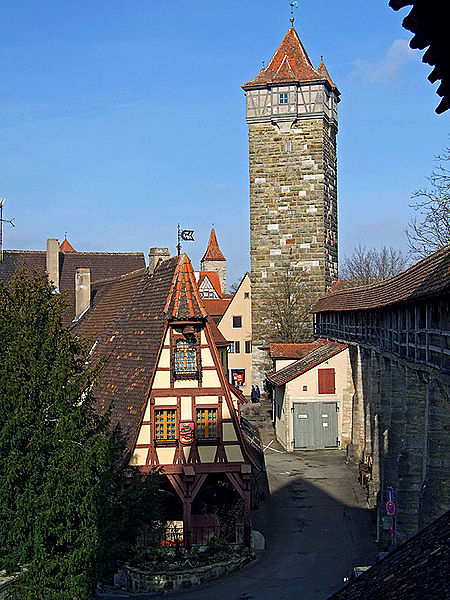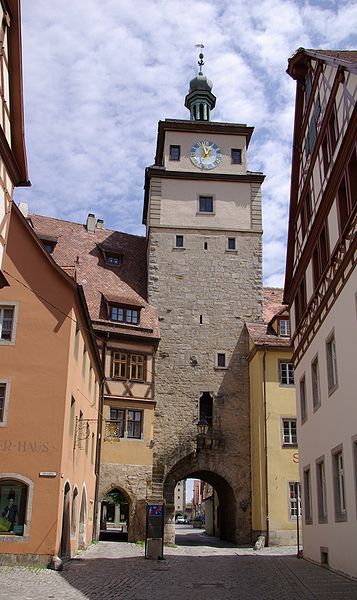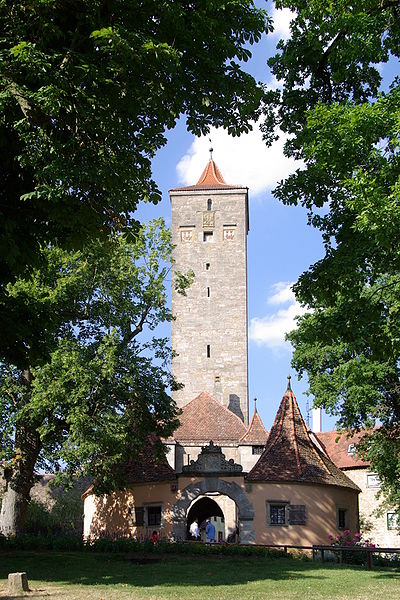A few towns and castles in Germany vie for the title of Most Suitable Setting for a Fantasy Novel, and Rothenburg ob der Tauber just might take the crown with its combination of working fairy-tale homes, alive-yet-dormant fortifications and its location on the  hillside overlooking a wildflower-bespeckled valley and the sparkling Tauber River.
hillside overlooking a wildflower-bespeckled valley and the sparkling Tauber River.
When I was a kid, I took two trips here with my uncle Peter and my Opa (grandpa) Rudi. Opa was a big history buff and took me all over Europe with him on his trips to auctions and Peter came along to make sure Opa didn’t beat me for being unable to recite the history of Franconian Free Cities or explain the uses of this or that medieval contraption. Peter needn’t have worried, I have been a fiend for towns like Rothenburg since I was able to walk, and for me, the walks through the lanes were marred only by other kids with their Opas and the occasional moped buzzing by to remind me that a witch probably would not appear before me and no knights would have protected me even if she had. Towns like Rothenburg ob der Tauber fueled my imagination and my appetite for reading, and I still get a sorrowful longing for the worlds of my dreams whenever I see pictures of this town, or read descriptions of its lanes, homes and walls.
Rothenburg retreated into the forests of Europe after the religious wars of the 16th, 17th and 18th centuries decimated most of Germany and left the rest of the continent licking its wounds. Bad for the locals who may have remembered glory days during the height of the Holy Roman Empire, but good for boys like me who could tour the criminal museum and marvel at the horrible ways men were interrogated and punished in the good old days. Like many tourist destinations, the city and the old Romantic Road trade route was re-discovered by bohemians in the late 1800s and since then has attracted visitors from all over the world.
 The whole of Rothenburg ob der Tauber is one big sight, calmly enjoying being seen, but for a small list of notable buildings look here to the official Rothenburg City site. Within the city, the homes and buildings themselves are the draw and rightly so. Many of the old patrician homes, official buildings and workshops of the medieval era are preserved as small museum-cafes or Frankish restaurants in the quiet, unobtrusive German style of tourism.
The whole of Rothenburg ob der Tauber is one big sight, calmly enjoying being seen, but for a small list of notable buildings look here to the official Rothenburg City site. Within the city, the homes and buildings themselves are the draw and rightly so. Many of the old patrician homes, official buildings and workshops of the medieval era are preserved as small museum-cafes or Frankish restaurants in the quiet, unobtrusive German style of tourism.
For a city full of wonders such as Rothenburg, its good to pick one of two methods: aimless wandering and gawking or a researched, analytical march from one historic building to the next. As a boy, the aimless method gave me the most pleasure because analysis would have probably taken the fun out of a romp through the old lanes. As a grown man, I feel the need to know who exactly built this building and why? Was the Toppler Castle a functional castle and for whom? Who lived here? What did they do? Only with this added background knowledge can my mind wander aimlessly through the conversations of old dukes and generals and craftsmen and construct a picture for my own pleasure. As a boy, I had no need of a duke’s name or an architects pedigree to get my mind going, in fact, any added knowledge would have dampened my popping synapses and Rothenburg ob der Tauber would have been lost on me.
My Opa was big on the second method and it has stuck with me to this day. In Rothenburg’s case, there are a few important things to know:
 1) Everybody and their cousin shows up here during the summer months; tourists from around the world, mostly retired and walking around in groups of 20 or more. To avoid these crowds (deadly to any imaginative endeavor), go in the fall or the winter or early spring. The winter is amazing and only the very interested or very learned seem to come at that time. If you manage to be here during Christmas, the crowds swell a bit, but its worth it for the market.
1) Everybody and their cousin shows up here during the summer months; tourists from around the world, mostly retired and walking around in groups of 20 or more. To avoid these crowds (deadly to any imaginative endeavor), go in the fall or the winter or early spring. The winter is amazing and only the very interested or very learned seem to come at that time. If you manage to be here during Christmas, the crowds swell a bit, but its worth it for the market.
2) You do not need a tour. There are books and videos for any research efforts you undertake and there are no sights inside or outside of the city that require someone to hold your hand. Except of course the Criminal Museum for those with overactive imaginations. (Thanks, Opa!)
3) Rothenburg ob der Tauber is one of a string of towns along a road from Frankfurt through Munich to Vienna that were once the most important of their time, but now serve as tourist destinations for old, young, male and female alike. Just like Route 66 or Highway 101, modernity made the Romantic Road into a backwater, economically speaking, but for those of us who wish we could have been born in times of high adventure, roads like these make for the trips dreams are made of. So if you go to Rothenburg, you might as well keep going to Wurzburg. And if you decide to keep going to Wurzburg, might as well go on ahead to Neu Schwanstein …


Comments